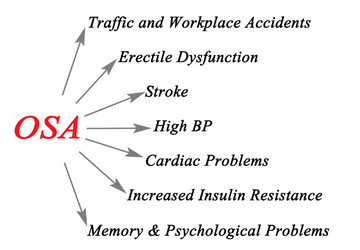Sleep Apnea
Sleep Apnea is a breathing disorder that causes the patient to repeatedly stop breathing (apnea) or to have very shallow breathing, for ten seconds or longer; these pauses may occur as many as 20-30 times or more per hour! When healthy sleep is interrupted by these pauses, it puts a strain on the heart; Sleep Apnea can prevent oxygen from getting to the brain and body. This lack of oxygen not only interrupts a person’s sleep, but it also affects the entire body. Not getting enough oxygen night after night can lead to high blood pressure, irregular heartbeat, heart attacks or stroke – there are studies ongoing to research the impact on the brain.

There are three kinds of sleep apnea: Obstructive Sleep Apnea which is caused by a blocked or collapsed airway; Central Sleep Apnea which is when the part of the brain that controls breathing does not send the correct signals to the muscles that control breathing; and Mixed Sleep Apnea which is a combination of obstructive and central sleep apnea.
Of the three kinds of sleep apnea, the most common cause of sleep apnea is OSA; an obstruction or collapse of the airway; throat muscles are abnormally relaxed, tongue and tonsils are larger than normal, being overweight, or airway is smaller than normal.
If you have sleep apnea and it is not treated, or not treated properly, you are at risk for:
- high blood pressure
- irregular heart rhythms or heart disease
- heart attack
- stroke
- pre-diabetes and diabetes
- depression
- increased likelihood of driving or work-related accidents
Untreated sleep apnea causes physical and emotional stress on the body, and ultimately can lead to death. Long-term cardiovascular complications of untreated OSA can put you at risk of daytime sleepiness, depression, irregular sleep cycles, and poor sleep quality.
Treating OSA helps the management of the other medical conditions you might have, including metabolic or cardiac issues. Sleep apnea is very common in people with atrial fibrillation (a quivering or irregular heartbeat) that can lead to blood clots, stroke, heart failure, and other heart-related complications.
How do you know if you have sleep apnea? Signs or symptoms include:
- loud or disruptive snoring
- excessive daytime sleepiness
- hypertension
- choking or gasping while you sleep
- morning headaches
- trouble staying asleep
- trouble concentrating
- irritability
- forgetfulness
- unexplained sleepiness
- mood swings
- personality changes
- feelings of depression
- waking up often during the night to use the restroom
- dry mouth and sore throat.
Who is at risk for OSA? You are at an increased risk if you are overweight, have high blood pressure, male with a neck size of 17 inches or more, female with a neck size of 16 inches or more, male over the age of 40, or a female over the age of 50.

